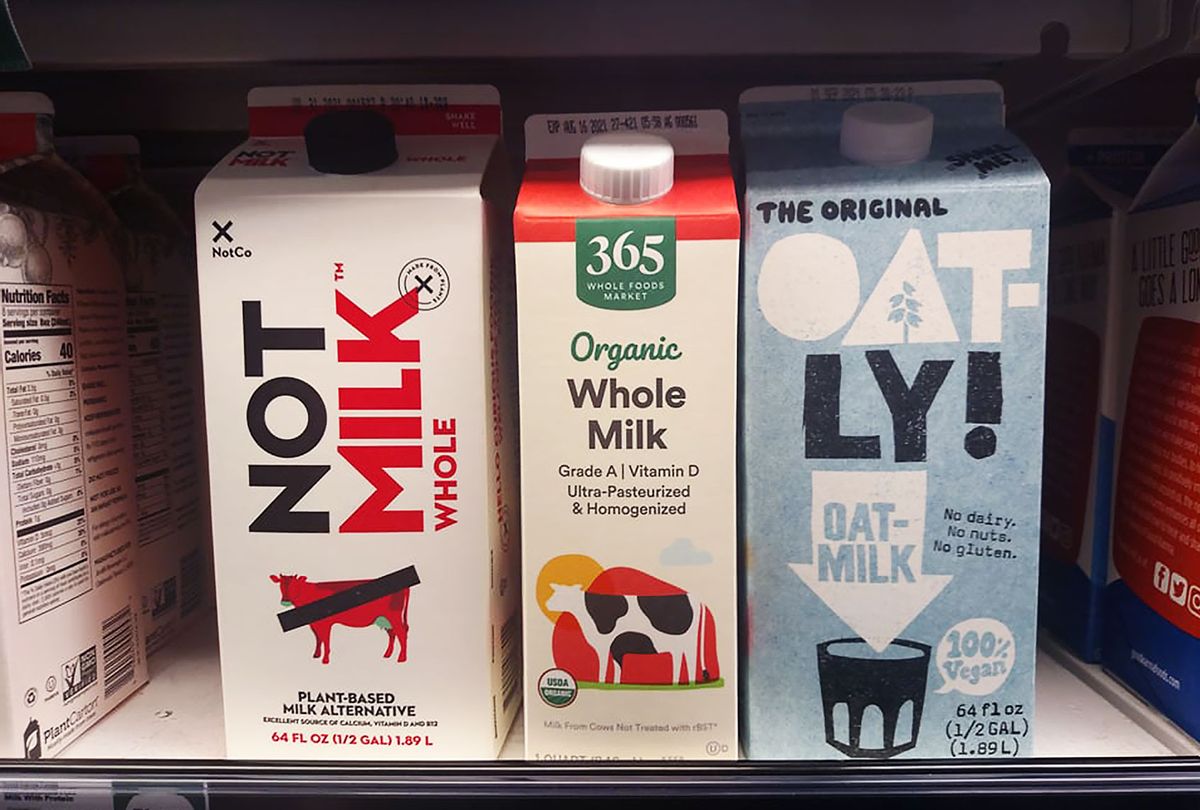I'm not a vegan, but in my day-to-day life, I tend to choose alt milks more often than not. My smoothies, coffee and cereal are all spiked with just a splash of whatever plant-based milk I have in the fridge — and my body just tends to feel better for it.
For about the past year, I've been very content with oat milk, but earlier this week I saw a Washington Post article titled, "NotMilk says it has achieved a breakthrough: Plant-based milk that mimics dairy."
"In the world of plant milks, the base ingredient is everything," Emily Codik wrote. "The variety is dizzying: cashew milk, soy milk, coconut milk, almond milk, oat milk, even macadamia milk. We call them milks, but they don't act like cow's milk."
It's true. The base ingredient can be overpowering — coconut milk, for instance, will first and foremost always taste like coconut — and some of these milks react poorly when heated or cooled, which minimizes the ability to cook or bake with them.
NotMilk purports to be different. It's made with an 18-ingredient formula that includes pea protein, pineapple juice, chicory root fiber, cabbage juice and sunflower and coconut oil. According to NotCo's founders, the mixture mimics actual dairy, and I was curious just how closely it actually did.
Gallons of reduced-fat and whole NotMilk are available at Whole Foods nationwide, so I stopped after work to pick some up for a taste-test alongside oat and whole milk. (There's a Whole and Oats/Hall and Oates joke here, but, ahem, "Some Things Are Better Left Unsaid.")
I drank it straight, poured it in coffee and used it in a basic Béchamel sauce. Here's exactly what happened:
Poured cold straight into a glass
Where oat milk is noticeably thicker and more, well, beige than dairy milk, NotMilk looked strikingly like the glass of whole milk that I poured. Seriously, I was holding the two glasses up to the (albeit shoddy) light in my apartment kitchen in what felt like a millennial recreation of the FFA competition scene from "Napoleon Dynamite" to try to spot the differences. In the right light, the NotMilk is a touch more brown.
As for taste, oat milk was the outlier again. It has a subtle, nutty sweetness that's almost akin to the milk found at the bottom of a bowl of cereal, which is one of the reasons I love it in baking. However, this makes it less ideal for straight drinking. (FYI: It's honestly been a really, really long time since I decided, "Hey, I'm going to go pour myself a glass of milk.")
Both the NotMilk and the whole milk were, foremost, creamy. While the whole milk had some secondary lactic and almost grassy flavors, the NotMilk veered a touch fruitier. Perhaps it was merely the power of suggestion after having read the ingredient list, but that sweetness did have some pineapple undertones.
Stirred into hot coffee
While I'm typically Team Cold Brew all year long, there are times when you just want a hot cup of coffee with frothy milk. Some plant-based alternatives simply don't hold up to the task. Almond milk tends to curdle almost immediately, and coconut milk — while delicious — is a definite mood, flavor-wise.
Oat milk is typically my go-to because it serves as a really beautiful counterpart to coffee's inherent bitterness, plus the texture is on point. As it turns out, NotMilk is another stellar option. While it forms more of a slick film than dairy milk, there's no weird clumping or curdling. The flavor is really pleasant, too.
Used in a Béchamel sauce
Alright, so this is where NotMilk really shines.
Over heat, the sugars present in some plant-based milks tend to take on a sweet, caramelized flavor. While this can be great for baking or in some coffee beverages, it's hit-or-miss in some dishes. See also: the unsavory curdling mentioned above. That can make cooking a Béchamel sauce — one of the French mother sauces made with butter, flour and whole milk — tricky.
Oat milk, again, tends to be my go-to if I'm veganizing a savory dish. It stands up to heat really well, and it doesn't get glommy (though the inherent "oat" flavor does become more pronounced).
NotMilk, it turns out, is also a really stellar choice. I used dairy butter to remove another variable from the sauce. After melting it and whisking it with flour until a roux formed, I added a steady stream of NotMilk. The sauce quickly thickened and became quite smooth and glossy.
Was it a little sweeter than whole milk? Yes, but a pinch of salt took care of that really quickly. I was ready to sprinkle in a little nutmeg and start layering the sauce into a gorgeous vegetarian lasagna.
The verdict
NotMilk is probably the closest analog I've found to whole dairy milk. If that's your jam, then it's worth buying.



Shares